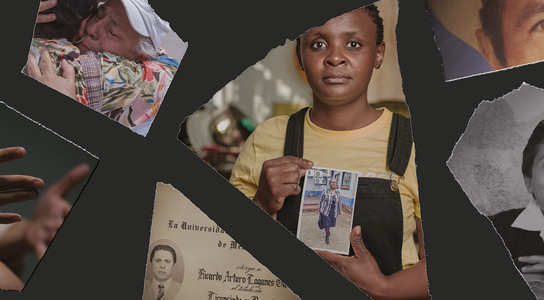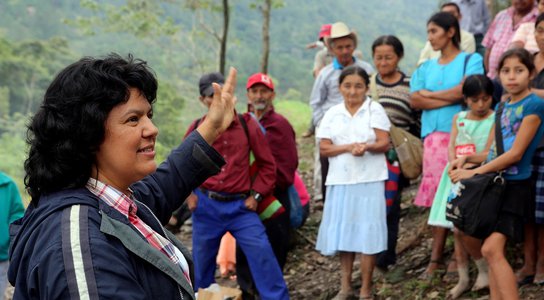It burned to ashes in little time. Hedme Castro, human rights defender and leader of the Organisation for Participative Citizenship (ACI Participa, by its acronym in Spanish), saw her house destroyed in November 2021. Hedme had to move into a new house to escape the persecution she faces for her work in Honduras.
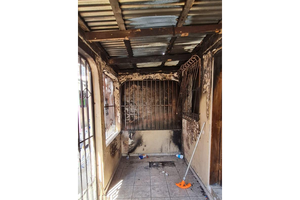
Human
rights defender Hedme Castro’s house in Honduras was burnt down in November 2021. Hedme Castro archive
Hedme has worked for years to expose the human rights abuses faced by those defending natural resources and their land. With ACI Participa, she began to travel to the hotspots across the country, documenting and reporting cases that no one was talking. The response was swift: she began to receive anonymous threats - including death threats - and was subjected to harassment and surveillance, as well as attacks by the police and other state and private actors.
Just a few weeks ago, on 14 July 2022, a group allegedly from the Police Investigation Directorate (DPI) tried to enter ACI-Participa's office in Tegucigalpa to seize security camera footage. The attacks have extended to other members of the organisation as well as looting of ACI Participa’s offices and extortion to continue operating.
Global Witness calls on the Government of Honduras to take urgent action to stop the reprisals against ACI Participa and any other land, environmental and human rights defenders and implement measures to deter such attacks in the future.The promise of a new Honduras
Global Witness is concerned about the security of staff members of ACI Participa, our civil society partner in Honduras dedicated to protecting defenders. The recent escalation of attacks including death threats, violence, surveillance and severe harassment constitutes a ringing alarm of human rights abuse that needs to be urgently addressed.
Honduras has a long history of attacks against defenders, particularly those protecting land and the environment. In 2020, Global Witness documented 17 lethal attacks against them. We have also documented systemic violations against communities, such as those living in Intibucá protecting the Gualcarque River or those standing up to stop pollution in the Guapinol River.
The challenges defenders faced are exacerbated by the widespread presence of drug trafficking and corruption in Honduras, a growing migration crisis, mistrust in state institutions and a budget crisis that has Honduras mired in debt.
In January 2022, the first female president in the country’s history, Xiomara Castro, came to power specifically committing to adopt protection policies for human rights defenders "with measures aimed at preventing violations of their rights; investigating threats and acts of violence against them with due diligence; punishing those intellectually and materially responsible; and providing reparations to the victims and their communities".
However, the outlook six months into her mandate remains challenging, and guarantees for human rights defenders are yet to be secured.
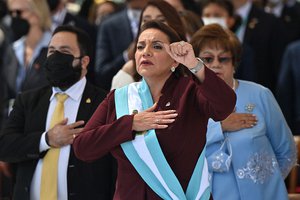
Xiomara Castro, the
first woman president in Honduras, came to power in January 2022 committing to
guarantee the rights of human rights, land and environmental defenders in the
country.
LUIS ACOSTA/AFP via Getty Images
Challenges from the frontlines
"Honduras is just recovering from a long period of authoritarian rule. We thought that changes would come quickly, considering that the current president comes from a progressive wing, with a strong discourse of guaranteeing rights to human rights defenders, backing up the feminist movement, and carrying on with anti-capitalist public discourse. But this is not the case, and the recent attacks are a good illustration of this," says Hedme, human rights defender and executive director of the ACI-Participa.
“Hope, but caution.” This is how Liliana Caballero, advocacy officer at the Centre for Justice and International Law (CEJIL), describes the last six months since the change of government in Honduras. "The risk is very great for human rights defenders. Not only because of the immediate threat but also because of all the legal and political baggage, the root problems do not go away. Conflicts in the territories continue to rage. Companies still have access to private security or support from local police forces. If we look at the micro level, the situation has not changed despite the advances at the macro level.”
Her diagnosis echoes the public declarations from other organisations, such as Human Rights Watch (HRW), which has presented a series of recommendations to the Castro government.
Hedme confirms this: "There has not been an adequate response to the aggressions we have suffered at ACI Participa, or those faced by the people we represent".
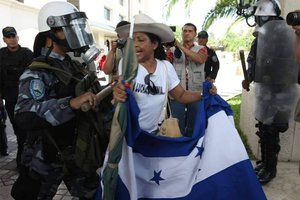
Hedme Castro denounced human rights abuses in Honduras for many years, facing constant attacks on herself, her family and the organisation she founded: Aci-Participa. Hedme Castro archive
The future Honduras deserves
The new government has shown significant political signs of guaranteeing conditions for the defence of human rights and the environment, such as the release of the Guapinol defenders and the prosecution and sentencing of those implicated in the murder of Berta Cáceres. Still, there is a long road ahead.
One of the most burning issues is the current situation of the ‘Protection Mechanism for defenders, journalists and people working in the judicial system’, a pioneering protection framework created in 2015 to uphold defenders’ rights which is facing a deep crisis. Liliana from CEJIL agrees and further explains: "The situation of the mechanism is very complex. It has been functioning poorly due to operational, financial, and personnel matters, as well as the lack of political will to improve it. However, the new administration has opened the gate to strengthen the mechanism from within to represent a trustful option for people accessing it. We hope these changes improve protection for human rights, land and environmental defenders."
The Inter-American Commission on Human Rights has called to remove the root causes driving attacks against defenders in Honduras.
Looking forward, Honduras must not ignore weaknesses in its institutional protection systems, corruption in the judiciary and impunity.
Likewise, the ratification of the Escazú Agreement(the first legally binding instrument in the world to include provisions on environmental defenders and applicable to Latin America and the Caribbean) by the Honduran Congress could open the door to greater transparency on the part of the private sector and recognition of land and environmental defenders in tackling the environmental and climate crises and promoting democracy.
Hedme has received offers of support to leave the country. Yet, she remains dedicated and refuses to leave Honduras: "I am staying in my country. I am not the one obstructing justice; I am not the one usurping democracy".
